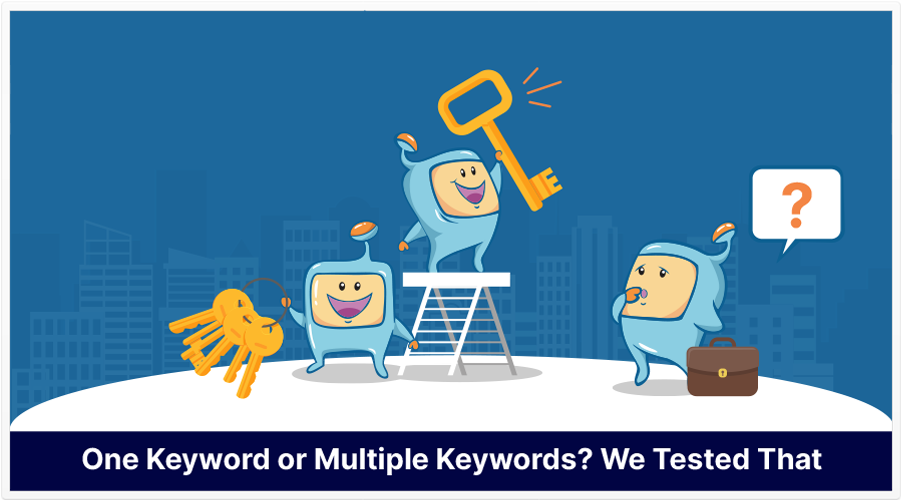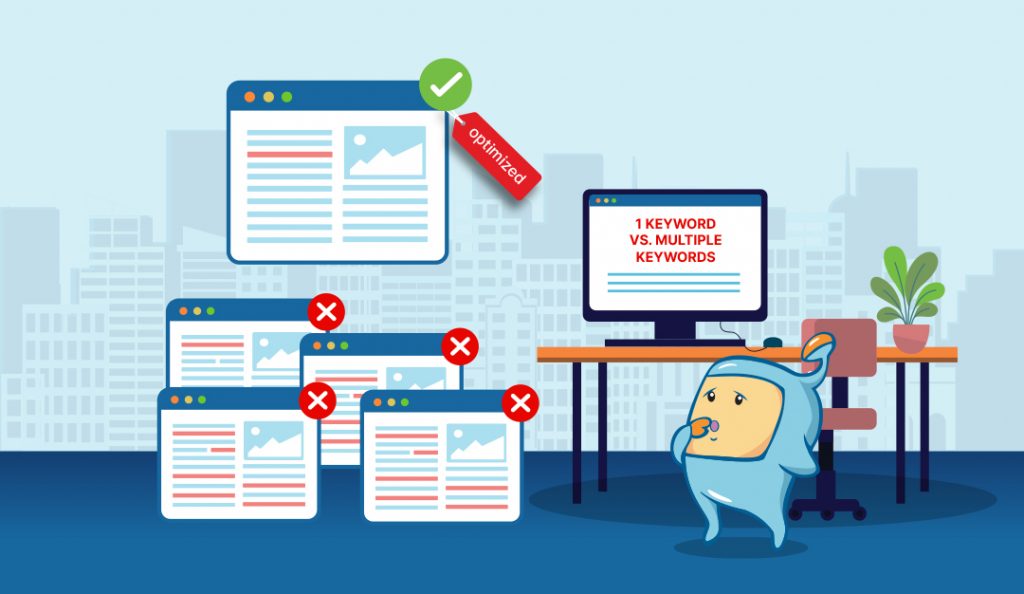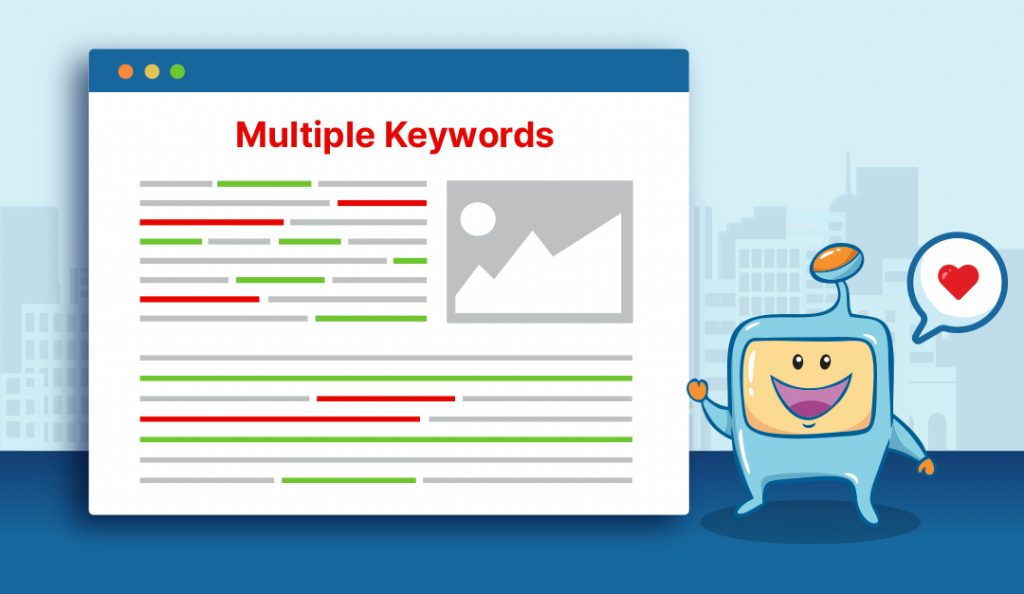
On-page optimization is a very important part of search engine optimization and getting your site ranked. One of the important aspects of SEO is keyword use, both for on page optimization and off page optimization. After doing keyword research and choosing the keywords to target to rank for relevant search queries, one of the important questions that come up is, should you optimize your page for one keyword or is it of more benefit to optimize for multiple keywords? How many keywords can you use on a page?

The first and most important step in SEO is choosing your keywords. You would not be able to start optimizing your page effectively without knowing the right keywords to use, and using the wrong keywords to optimize is a wasted effort. Imagine going through the effort of ranking for a term that has not much search traffic. You might be number one but if there is only 10 searches per month for that term, why bother?
If you already know your keywords, then move on to the next section, if not, let’s start with the basics of keyword research.
Keyword research is mainly researching and understanding your potential customer and what they use when they search for your site, product, or service. Once you discover what your target audience is searching for, you will be able to optimize for that particular term, and show up for that term when people search for it in search results, and gain organic traffic to your site. A lot of people skip through keyword research with the thought that they already know their target audience or target customers and they already know what they are searching for in search engines. However, what you want to rank for and what people are actually searching for can be different. Knowing your audience and doing the research to see real data will make your keyword targeting much more effective and campaigns much more successful and worth it. Like I said, why go to the trouble of optimizing for a term that not much people are searching for?
The first step is listing down all the keyword ideas that you would like to rank for and keywords that you think people are searching for. After listing those keywords down, use a Keyword Research Tool to look into the data for these particular topics or terms. Keyword research tools are keyword tools, software, sites that gather data from search engines. These seo tools provide data such as the keywords or keyword phrases used by people when searching, the average monthly search volume for those terms, some similar keywords, and some keyword suggestions or keyword opportunities, plus their corresponding search volume, too. Some examples of keyword research tools that you could use are – Google Ad’s Keyword Planner, Google Trends, Moz’ Keyword Explorer, Answer the Public, among others. Using a keyword tool will help you discover the keywords that most people are using in organic searches and these keywords that people are searching for are the ones that you should be targeting. However, targeting top keywords that people are searching for is not the only way to go, you can also target medium search volume keywords with less competition. Sometimes, this can be more beneficial, too, as competition is also a factor when doing keyword research and when doing SEO as often times, competitive keywords are quite hard to rank for. For a more detailed discussion on Keyword research, choosing the right keywords to target, and coming up with a keyword strategy, I would recommend checking out our article on Keyword Research.
So now that you have a good idea what your primary keyword, secondary keyword, keyword phrase, keyword variations, and long- tailed keywords are, let’s proceed to keyword optimization and whether to optimize for one keyword or multiple keywords for one page.

In Test 24 of the SIA, it was tested if optimizing a page for multiple keywords is better than optimizing for only one keyword. This test was based on Rand Fishkin’s argument on keyword usage and that when you are facing multiple variations of a target keyword, that you should not create individual pages for those keywords, rather you should use these multiple keywords into one intelligently optimized page as the intent for all the searches is the same. In this test, it was found that the page that was optimized for only one keyword won versus a page that has multiple keyword targeting.
Based on this test and our experience with ranking pages, our contention is that, it is still best to target one particular keyword per page, especially if the keyword is an important keyword that you are trying to rank for in search queries.
Based on our other tests, having the keyword that you are targeting in the Meta title, body, and H1 are top on page ranking factors and are places where you should place your keyword. This means that in those places, it is crucial to have your target keyword as Google gives importance on those areas and having one keyword used on all those area helps Google identify the topic of the page and rank you for that term.

Based on studies of ranking pages, it is natural for high ranked pages to also rank for multiple keywords. This means that if you optimize for a single keyword and you get ranked for that keyword, you also have a tendency to rank for additional keywords that are related to that primary keyword.
When optimizing for one particular term, it is also natural to use variations of the keyword and other related keywords in the content. Doing so would also give you a good chance of ranking for these other terms. But generally, the main focus should still be on the target keyword that you are trying to rank for. Rank for that specific keyword and you would also be able to rank for those other terms.

Low quality content will not get you ranked as low quality content is not good user experience and as we always mention, Google is all about user experience. When writing your content, your top priority should always be to come up with high-quality content that people are interested in, will search for, and would be able to satisfy their intent when they search and click for your content. Be as thorough as possible and satisfy all grounds, much like a one stop shop that has everything you need, your resource should include everything that your searcher needs. This way, you satisfy the intent of the user, plus, more time on site, less bounce rate, and you gain the trust of the user for being a reliable source of information and for succeeding searches, they might go to your site, too! Plus, when you have great content, people would naturally link to your page, how’s that for natural backlinks? Lastly, aim to be a better resource than your competitors. Check what is currently ranking then do better than the ones on top. Provide high quality, well-researched, exhaustive content, and of course, use your main keyword in your content and the critical on-page areas and use relevant keywords in your content, too.

Are there instances where you could target more keywords on a single page? If so, how many other keywords?
For low competition keywords or long tail keywords, it is possible to target multiple keywords on a page, as long as they are a related keyword, the searcher intent is similar, and naturally come up in the article. For this case, choose a main topic or main keyword that the content will revolve around, use that keyword on your Page Title, Meta descriptions, H1, and content, and for other keywords to target, have them in your other heading tags and your content also. Still, it is best to limit the use of multiple keywords to a maximum of 4 as doing too many keywords can lessens your chances of optimizing the page well, and lessens your ability to rank for those terms.
Another thing, avoid using unrelated keywords and keyword stuffing as this would only have a negative effect on your page. While I did mention creating a high quality and comprehensive content, try not to stuff everything in one single blog post. You can create multiple pages targeting specific keywords for every single page.
Focus on optimizing for one keyword per page, especially for important keywords that you would like to rank for. Optimizing for a main keyword, creating high-quality content around that keyword, and getting ranked for it also gives you a good chance to rank for related keywords. But more importantly, make sure to target the right keywords and build content around it that people are searching for and are interested in. Otherwise, you would just be wasting your time and effort, ranking for a term that no one is searching for or content that no one is interested in.
Want to learn more about SEO and come up with a seo strategy to rank higher in Google and other search engines? Check out our other blog post on SEO and Digital Marketing.